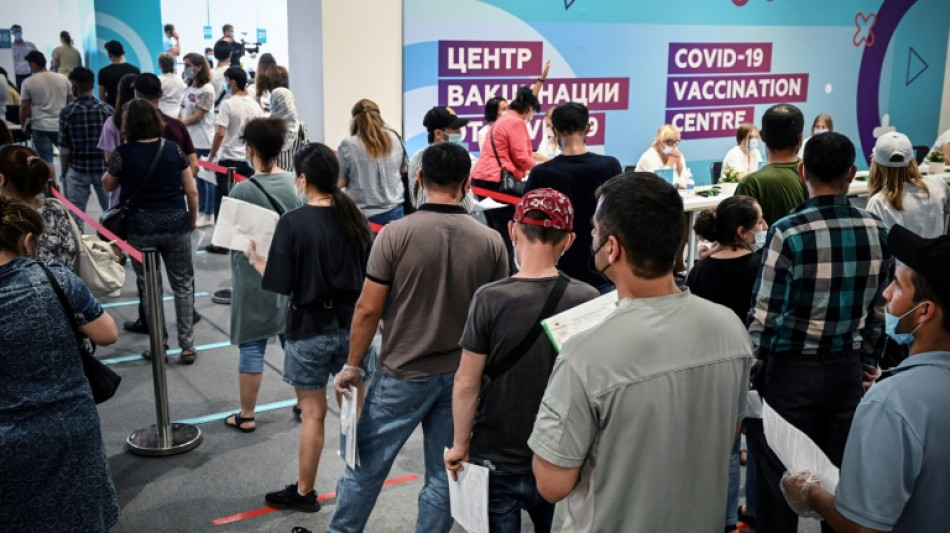
-
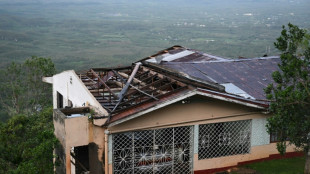 'Nowhere to sleep': Melissa upends life for Jamaicans
'Nowhere to sleep': Melissa upends life for Jamaicans
-
Irish octogenarian enjoys new lease on life making harps
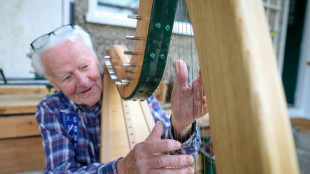
-
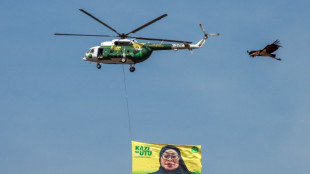 Tanzania blackout after election chaos, deaths feared
Tanzania blackout after election chaos, deaths feared
-
G7 meets on countering China's critical mineral dominance
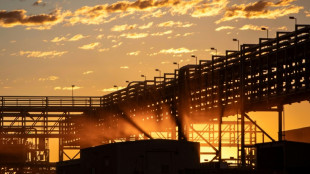
-
 Trump hails tariff, rare earth deal with Xi
Trump hails tariff, rare earth deal with Xi
-
Court rules against K-pop group NewJeans in label dispute

-
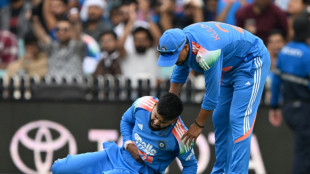 India's Iyer says 'getting better by the day' after lacerated spleen
India's Iyer says 'getting better by the day' after lacerated spleen
-
Yesavage fairytale carries Blue Jays to World Series brink

-
 Bank of Japan keeps interest rates unchanged
Bank of Japan keeps interest rates unchanged
-
Impoverished Filipinos forge a life among the tombstones

-
 Jokic posts fourth straight triple-double as Nuggets rout Pelicans
Jokic posts fourth straight triple-double as Nuggets rout Pelicans
-
UN calls for end to Sudan siege after mass hospital killings

-
 Teenage Australian cricketer dies after being hit by ball
Teenage Australian cricketer dies after being hit by ball
-
As Russia advances on Kupiansk, Ukrainians fear second occupation

-
 Trade truce in balance as Trump meets 'tough negotiator' Xi
Trade truce in balance as Trump meets 'tough negotiator' Xi
-
China to send youngest astronaut, mice on space mission this week

-
 Yesavage gem carries Blue Jays to brink of World Series as Dodgers downed
Yesavage gem carries Blue Jays to brink of World Series as Dodgers downed
-
With inflation under control, ECB to hold rates steady again

-
 Asia stocks muted with all eyes on Trump-Xi meeting
Asia stocks muted with all eyes on Trump-Xi meeting
-
Personal tipping points: Four people share their climate journeys

-
 Moto3 rider Dettwiler 'no longer critical' after crash: family
Moto3 rider Dettwiler 'no longer critical' after crash: family
-
US economy in the dark as government shutdown cuts off crucial data

-
 Trump orders nuclear testing resumption ahead of Xi talks
Trump orders nuclear testing resumption ahead of Xi talks
-
'Utter madness': NZ farmers agree dairy sale to French group

-
 Samsung posts 32% profit rise on-year in third quarter
Samsung posts 32% profit rise on-year in third quarter
-
30 years after cliffhanger vote, Quebec separatists voice hope for independence

-
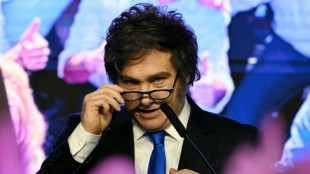 Taxes, labor laws, pensions: what Milei wants to do next
Taxes, labor laws, pensions: what Milei wants to do next
-
South Sudan's blind football team dreams of Paralympic glory
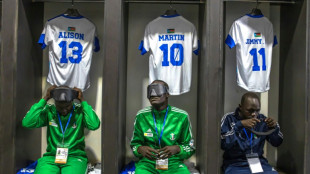
-
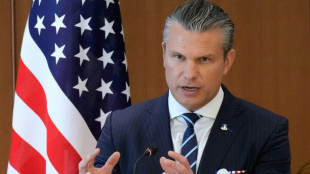 US says 4 killed in new strike on alleged Pacific drug boat
US says 4 killed in new strike on alleged Pacific drug boat
-
What we do and don't know about Rio's deadly police raid
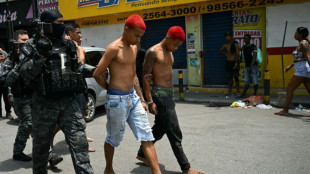
-
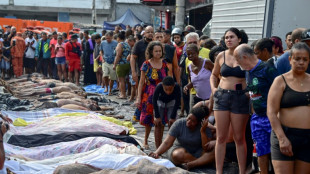 'They slit my son's throat' says mother of teen killed in Rio police raid
'They slit my son's throat' says mother of teen killed in Rio police raid
-
Arteta hails 'special' Dowman after 15-year-old makes historic Arsenal start

-
 Google parent Alphabet posts first $100 bn quarter as AI fuels growth
Google parent Alphabet posts first $100 bn quarter as AI fuels growth
-
Underwater 'human habitat' aims to allow researchers to make weeklong dives

-
 Maresca slams Delap for 'stupid' red card in Chelsea win at Wolves
Maresca slams Delap for 'stupid' red card in Chelsea win at Wolves
-
'Non-interventionist' Trump flexes muscles in Latin America

-
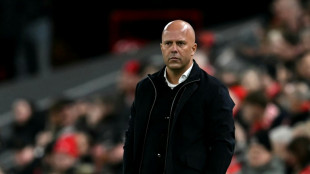 Slot defends League Cup selection despite not meeting 'Liverpool standards'
Slot defends League Cup selection despite not meeting 'Liverpool standards'
-
'Poor' PSG retain Ligue 1 lead despite stalemate and Doue injury

-
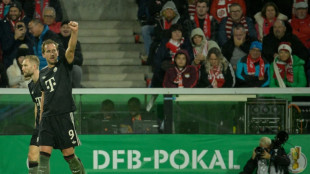 Kane nets twice in German Cup as Bayern set European wins record
Kane nets twice in German Cup as Bayern set European wins record
-
Liverpool crisis mounts after League Cup exit against Palace

-
 Juve bounce back after Tudor sacking as Roma, Inter keep pace with leaders Napoli
Juve bounce back after Tudor sacking as Roma, Inter keep pace with leaders Napoli
-
Kane scores twice as Bayern set European wins record
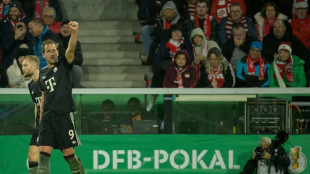
-
 Radio Free Asia suspends operations after Trump cuts and shutdown
Radio Free Asia suspends operations after Trump cuts and shutdown
-
Meta shares sink as $16 bn US tax charge tanks profit

-
 Dollar rises after Fed chair says December rate cut not a given
Dollar rises after Fed chair says December rate cut not a given
-
Google parent Alphabet posts first $100 bn quarter as AI drives growth

-
 Rob Jetten: ex-athlete setting the pace in Dutch politics
Rob Jetten: ex-athlete setting the pace in Dutch politics
-
Juve bounce back after Tudor sacking as Roma keep pace with leaders Napoli

-
 Favorite Sovereignty scratched from Breeders' Cup Classic after fever
Favorite Sovereignty scratched from Breeders' Cup Classic after fever
-
Doue injured as PSG held at Lorient in Ligue 1


Russia loses a million people in historic population fall
Russia's population declined by more than one million people in 2021, the statistics agency Rosstat reported Friday, a historic drop not seen since the collapse of the Soviet Union.
Ongoing demographic woes have been exacerbated by the pandemic with Rosstat figures showing more than 660,000 had died with coronavirus since health officials recorded the first case in the country.
The new figures continue a downward trend from the previous year when Russia's population fell by more than half a million.
The Covid-related fatalities figures published monthly by Rosstat are far higher than death figures released by a separate government website, which is dedicated to tracking the pandemic in the country.
Those government website figures only take into account fatalities where the virus was established as the primary cause of death after an autopsy and shows just 329,443 total fatalities.
The discrepancy has fed into criticism that the Russian government has been downplaying the severity of the pandemic in one of the worst-hit countries by cases in the world.
Russia has struggled to curb the pandemic due to a slow vaccination drive coupled with limited restrictive measures and rampant non-compliance with mask-wearing in public places.
The pandemic death toll exacerbates the demographic crisis, linked to low birth rates and a short life expectancy, that Russia has faced for the past 30 years.
Birth rates have been falling because the generation now becoming parents were born in the 1990s, when the birth rate plunged due to economic uncertainties after the collapse of the Soviet Union.
The number of births per woman stands at around 1.5, well short of the minimum of 2.1 necessary to renew the population.
- Economic concerns -
Russia's shrinking population has been at the top of President Vladimir Putin's domestic agenda since he came to power over two decades ago.
In addresses to the nation, Putin frequently encourages Russians to have more children and live a healthier lifestyle to improve life expectancy.
The government has introduced a number of financial incentives for parents with more than one child, such as cash bonuses and favourable mortgage rates.
During his annual press conference last December, Putin stressed that 146 million people are not enough for the country from a "geopolitical standpoint" and leave labour shortages.
He added that it is important to show that it is a "joy to have children" and that there is "no greater happiness in life and in the world".
"The demographic crisis is definitely a failure of the state's policies," said Sergei Zakharov, a demography expert at the Higher School of Economics based in Moscow.
He told AFP that measures to increase the birth rate encourage families to have children earlier but do not change how many children they want in total.
He said the government's influence on birth rates is "limited" and shifting births to an earlier period will result in a "demographic gap" in the future.
For Stepan Goncharov of the independent Levada Centre pollster, the low birth rate is connected to widespread "uncertainty about the future".
Living standards in Russia have continuously deteriorated since 2014, with the economy strained by repeated Western sanctions, dependence on the oil and gas sector and widespread corruption.
"People haven't stopped buying and their income and savings have reduced," Goncharov said.
According to last year's survey by recruitment website SuperJob, 43 percent of Russians do not have any savings.
"People are not setting money aside and are not planning the future of the family," Goncharov added.
N.AbuHussein--SF-PST
